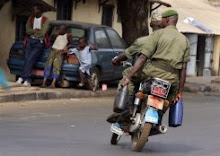Army officers in Guinea-Bissau have detained their army chief and briefly arrested Prime Minister Carlos Gomes Junior, in an apparent coup attempt.
Hundreds of people poured out on to the streets to demand Mr Gomes Junior be freed. Witnesses say he was released and is now under house arrest.
Rebellion leader Gen Antonio Indjai threatened to kill the prime minister if the protests did not end.
But he later said the day's events had been a military problem, not a coup.
Portugal and France have condemned what they termed a coup, with Lisbon calling for a return to constitutional order in its former colony.
Since gaining independence from Portugal in 1974, Guinea-Bissau has suffered several coups - and last year, army officers assassinated President Joao Bernardo Vieira.
Soldiers' problem?
Gen Indjai was keen to play down the rebellion.
"Events which occurred this Thursday morning are a purely military problem and do not concern the civil government," he said in a statement on national radio, according to the AFP news agency.
"Military institutions remain, and will remain, submissive to political power."
President Malam Bacai Sanha, who heads the country, also played down the incident, saying the situation was now under control.
He said it had been a "problem between soldiers" that had spilled over into the civilian government.
"I will use my influence to find a friendly solution to this problem," he said.
Threat to kill
Army sources said Chief of Staff Gen Jose Zamora Induta and 40 other officers were still being held in the capital, Bissau.
And despite his later statement, Gen Indjai earlier said he wanted to try Mr Gomes Junior - known as "Cadogo" - as a "criminal".
"Cadogo is a criminal and he must be tried as one," he said.
"If the people continue to go out into the streets to show their support for Carlos Gomes Junior, then I will kill Carlos Gomes Junior, or I will send someone to kill him."
Witnesses said the crowds dispersed following the general's threat.
Gen Indjai was accompanied by former navy chief and suspected leader of a 2008 coup, Rear Admiral Jose Americo Bubo Na Tchuto, who the soldiers were said to have freed earlier.
He was reported to have left a UN building in Bissau, where he had taken refuge since December last year.
He had returned to the country after spending a year in exile in Gambia following a coup attempt he was accused of leading in 2008.
Earlier, national radio interrupted its programmes to play military music, which is considered code for a coup.
Source: BBC (01/04/2010)

No comments:
Post a Comment